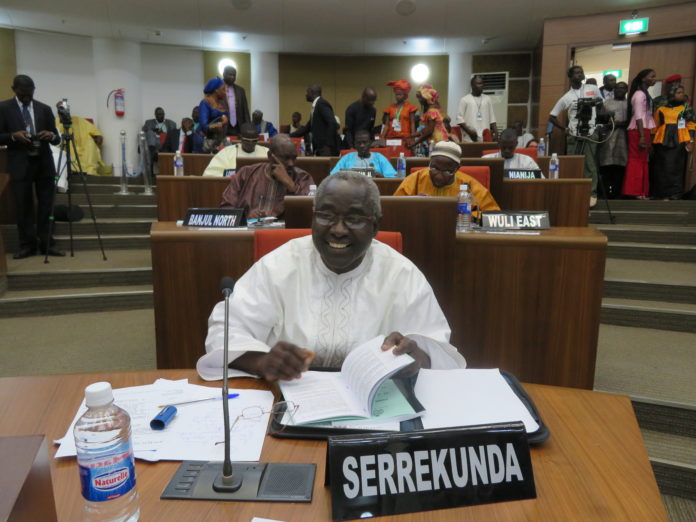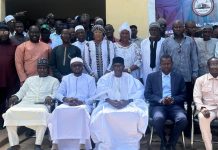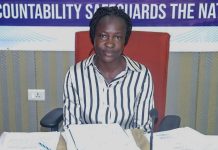By Momodou Jarju
Halifa Sallah, the national assembly for Serrekunda has on Wednesday called on people who may be saying they would vote against the draft constitution because secular is not included or because Sharia is included, to rethink on their stands.
The issue of whether secular should be included in the draft constitution generated heated debate when it was first published for public scrutiny.
Sallah was speaking at the national assembly yesterday on the debate of the merits and principles of The Gambia Promulgation Bill 2020 moved by attorney general and minister for justice, Dawda Jallow.
He explained that though the principle of secularity of The Gambia is not written directly in the draft constitution, section 88 of the aforesaid constitution restricted the room where the president will get up one day and declare The Gambia as a particular state. He added that used to be a problem.
Sallah said the clause should be entrenched. Notwithstanding, he said section 153 of the draft constitution bar the national assembly from passing any law that declare the country as a particular state.
“So that is clear. Now the contradictions in terms of object and reason honorable speaker some are saying that ‘is not adequate, put secular there and don’t put Shariah there because that would show that you are aligning with a particular religion’. Let us look at these principles very clearly. What is best is to have put secular. But within the context of the commission they say well, this is what we can put. That is the job we assigned them. That’s what they can do. That’s the context and the content. That’s what they can do.
“But to those who may say ‘I will vote against this constitution because secular is not there’ well they must rethink. Those who say ‘I will not vote because Sharia is there’ they must rethink; because the fundamental rights and freedoms give power not to be discriminated. Is an equality principle….Whilst a religion may have its peculiarities to those who believe in it. So if the religion says this is how you should share based on the religion because the obligations are different and it is not put in the constitution that the laws of that religion is respected for those people who believe in that religion, it means that you can rely on the constitution on the discrimination clause to claim for a right that goes against the very principle of that religion.
“Then why don’t you just abandon the religion and go and have a state marriage or convert to another religion. Why should you worry to belong to a religion that you don’t have faith? Nobody stops you from doing that. And those are the safeguards that we must put into consideration to be able to move forward to respect the group rights, to explain things very clearly so that we understand that we want a united Gambia and we want to move forward,” he said.
Read Foroyaa tomorrow for detail of Halifa’s deliberations on the procedures…
The reasons for supporting the granting of automatic citizenship to children born in The Gambia to non-Gambian parents included the assertion that it would be in the best interest of the children, and that not granting them citizenship would render them stateless upon birth. Furthermore, PPP, IPC and FGD participants, and many Diaspora Gambians who participated in the consultations said that citizenship is a fundamental right that should not be denied children born in The Gambia, even if their parents are non-Gambian at the time of their birth.
On the other hand, some Gambians felt that children born in The Gambia to non-Gambian parents should not be granted automatic citizenship. Thus, 13.3% of IPC participants, 15.4% of FGD participants and 22.9% of PPP respondents did not want children born in The Gambia of non-Gambian parents being granted automatic citizenship. Interestingly, a high proportion, 52% of participants during the consultations in Europe supported this position; 39% of consultation participants in the USA supported the same position. The reasons for the opposition to granting automatic citizenship to children born of non-Gambian parents include the need to judiciously manage the nation’s resources (FGD participants), and the need to reduce competition for the meagre resources of the country (Europe consultation participants).
The Report indicated that the CRC carefully considered all the submissions relative to citizenship by birth. Without a doubt, citizenship by birth is one of the most complex issues to resolve in any constitutional reform process. Birthright citizenship is generally well guarded and requires careful balancing. Persons who, prior to the coming into force of the new Constitution, were citizens of The Gambia have their Gambian citizenship guaranteed under the new Constitution; that is only considered fair and it is the right thing to do.
The CRC considered the public opinion to grant automatic citizenship to children born in The Gambia to non-Gambian parents. It recognised, however, that this opinion required further consideration. It was considered important that persons granted automatic citizenship at birth could have huge consequences on national resources which, if not properly managed, could lead to potential socio-economic imbalances. This took into account the fact that The Gambia is currently one of the most densely populated countries in Africa with limited resources, considering the population density increase from 130 persons per sq. km of land area in 2000 to 225 persons per sq. km of land area in 2018. Accordingly, the CRC came to the conclusion that this is a subject that requires further study (which the CRC could not properly do having regard to the timeframe within which it had to carry out its assignment) and therefore recommends that the subject be taken up and considered further by the Government and the National Assembly.
However, the CRC considered it important that the issue of children born in The Gambia and currently living in the country should be given special consideration in the granting of citizenship. This, like the issue on automatic citizenship requires further study as well. The study must take into account the number of such persons born and living within the country as at 31st December, 2019 and a determination of resource capabilities and distribution. The cut-off period of 31st December 2019 has been provided specifically for 2 reasons. First, to recognise this category of children born in The Gambia of non-Gambian parents and living in the country; and second, to prevent an undesirable rush to the acquisition of citizenship for children in an uncontrolled atmosphere before a proper determination is made on the issue of automatic citizenship (that is, whether or not the country can handle such an arrangement).
It is in this context that the CRC considered it prudent for the National Assembly to consider this category of children born in The Gambia of non-Gambian parents for purposes of according them Gambian citizenship. This would have taken into account the results of the study recommended. In a similar vein, the National Assembly is empowered to consider enacting legislation for the registration of other persons who are not eligible for Gambian citizenship under Chapter IV of the Draft Constitution.





















